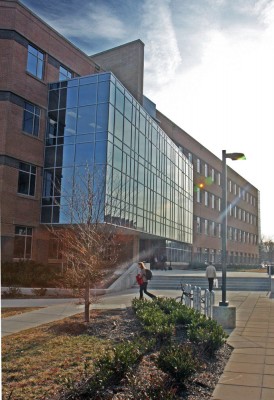
The Volgenau School recently had its name changed to better reflect the direction the school has gone in. Photo by Peter Flint
The Volgenau School of Information Technology and Engineering has had “information technology” dropped from its title to better reflect the direction the school has gone in.
“IT was the primary focus when the school started,” Dean Lloyd Griffiths said. “We have a broader focus now, which is excellence in engineering and research, particularly with our new Department of Bioengineering.”
Griffiths said the school is expanding into areas like sustainability and environmental engineering.
After receiving approval to offer a Bachelor of Science in bioengineering in 2010, Griffiths said he sought approval for a department of bioengineering. The request has reached the State Council of Higher Education for Virginia, which is the final stop in the process. By establishing a bioengineering department, the school will be able to offer graduate degrees in the subject.
“Bioengineering will have 250 to 350 undergraduate students with a graduate student body of the same size,” Griffiths said. “We’re hiring additional faculty with the funds Dr. Volgenau gave to name the school.”
Bioengineering explores such areas as neural engineering, the application of statistics and computer science to molecular biology which is known as bioinformatics, the structure of the human genome and visualizations like MRI scans and ultrasounds.
In 2005, Ernst and Sara Volgenau gave a gift of $10 million to the school. The school was named after the Volgenaus in honor of their gift.
Griffiths said there is enough space in the current facility for another year or two, but that more space will be needed as the school continues to grow.
“The university is looking at building another research building,” Griffiths said. “We’re working closely with the College of Science, and I think together we can present a case that there is a need for a shared building for biology and bioengineering.”
Griffiths said the biggest problems facing the school are both financial.
“There will be no faculty raises for five years due to state restrictions,” Griffiths said. “That puts us at risk for our faculty to be lured away by other institutions.”
Griffiths said there are many highly dedicated faculty at George Mason University, and though they have not had a raise in four years, they work hard and help advance research.
Griffiths said the other problem is with student scholarships.
“We have all these students applying here and to other schools, some very good ones of course, and those schools are able to offer better scholarships.”
Griffiths said teaching assistants are paid around $12,000 a year while competing schools offer up to $20,000 a year.
“We’re trying to find that extra $9,000 to lure the best students here,” Griffiths said. “The state budget is really hurting us. We’re not alone. A lot of other universities are in trouble as well.”
Griffiths said the school is also looking at emphasizing robotics and microrobotics in the future.
“There’s some pretty exciting stuff going on,” Griffiths said. “There’s talk of machines that could go into our bloodstream and fight cancer and disease.”
Griffiths said robotics is important in the future and that there is considerable student interest in the field.
“Another area we’re interested in is in the gaming area,” Griffiths said. “The kinds of games we do are what are called serious games — games that people use in simulation environments, in training environments and in medical diagnosis.”
Griffiths said the gaming field is rapidly growing, with close to 180 students already studying it at Mason.






Comments